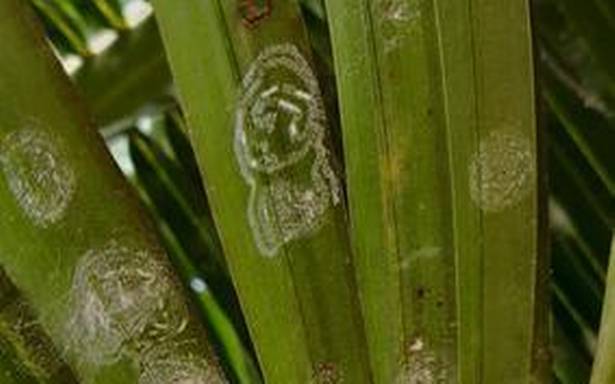Isaria Fumosorosea, a bio-pesticide, is being supplied to farmers, say officials
The infestation of Rugose Spiralling Whitefly (RSW) that gave a hard time to the coconut, oil palm, banana growers in the State in 2020 made a comeback again in September this year. Scientists, who took the infestation, say that the severity showed a downward trend in December 2019 and was nearly controlled the following year.
According to information, the infestation has been reported in Nellore, East and West Godavari districts. Mango Research Station (MRS) principal scientist B. Kanaka Mahalakshmi says that efforts are on to create awareness on the controlling measures among the farmers. “Controlling measures by one or two farmers will not yield the desired results. The farmers in an entire village or area where the infestation has been identified have to take up the measures,” she says.
The Rugose Spiralling Whitefly infestation was first reported in the nursery gardens at Kadiyam of East Godavari district during late December 2016. The pest may have come to the State through infested coconut seedlings obtained from Kerala. However, its incidence and severity reduced subsequently, the scientists say. They advocate bio-control measures to deal with the infestation eficiently.
“Spraying of Isaria Fumosorosea, a bio-pesticide fungus, with high jet sprayers in an interval of 10 to 15 days when temperature is not high can yield good results. The spraying operations should be done early in the season as and when the infestation is idenitifed. It can have more impact and arrest the infestation,” says B.V. Chalapathi Rao of the Horticultural Research Station (HRS) at Amabajipeta.
Bio-agent multiplication units
Andhra Pradesh Agriculture Mission Vice-Chairman M.V.S. Nagi Reddy says that the problem has been brought to the notice of the government. “It has been suggested to establish bio-agent multiplication units under the schemes sponsered by the Centre such as Rashtriya Krishi Vikas Yojna – Remunerative Approaches for Agriculture and Allied Sector Rejuvenation (RKVY-RAFTAAR) and supply bio-pesticide to farmers in sufficient quantities,” he says.
Horticulture Department officials say that the infestation can affect the yield by 15% to 20%. As part of the measures to control the infestation, the government has been supplying Isaria Fumosorosea to farmers, they say.
Source: Read Full Article

